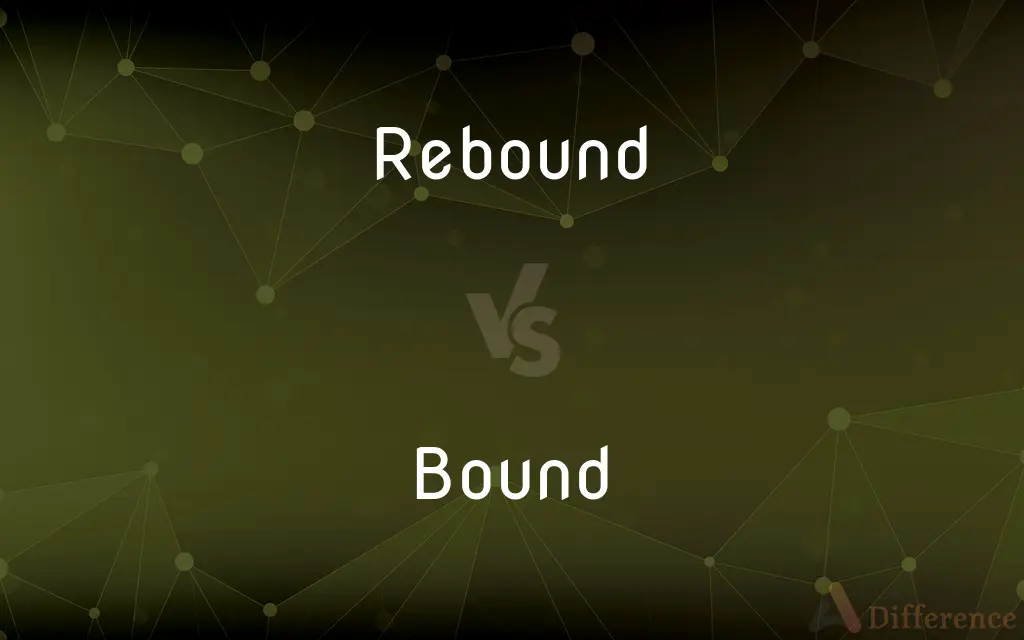Rebound vs. Bound — What's the Difference?
Edited by Tayyaba Rehman — By Fiza Rafique — Updated on April 26, 2024
Rebound refers to the act of bouncing back after hitting a surface or the recovery after a downturn, whereas bound pertains to being tied, obligated, or destined in some way.

Difference Between Rebound and Bound
Table of Contents
ADVERTISEMENT
Key Differences
Rebound primarily denotes a return or recovery from a previous state or position, often used in sports and economics. On the other hand, bound has multiple meanings, including being tied up, restricted, or headed towards a destination.
In sports, a rebound is the act of catching the ball after a missed shot in games like basketball, while bound can refer to an athlete's leaping action or movement towards a goal.
In the context of recovery, rebound might describe the quick recovery of stock prices after a crash, whereas bound can signify an obligation or commitment, such as a country bound by a treaty.
In literature, a rebound can symbolize emotional recovery, such as bouncing back from heartbreak. In contrast, bound is often used metaphorically to describe characters who are constrained by circumstances or fate.
In physics, rebound involves the elastic collision where an object returns to its original form after impact, while bound refers to particles or components confined within a system, like electrons bound to a nucleus.
ADVERTISEMENT
Comparison Chart
Definition
Act of bouncing back or recovery
Being tied, obligated, or destined
Usage in Sports
Catching the ball after a miss in basketball
Leaping action or movement towards a goal
Economic Context
Recovery of stock prices or economic indicators
Legal or contractual obligation
Literary Use
Symbolic emotional recovery
Constrained by circumstances or fate
Physics
Elastic collision returning to original form
Particles confined within a system
Compare with Definitions
Rebound
The action in sports of recovering the ball after a missed shot.
He led the game in rebounds last night.
Bound
Obligated by law, duty, or circumstance.
She felt bound by her promise to help.
Rebound
Returning to a previous state of health or success.
She rebounded from her illness faster than expected.
Bound
Tied or secured physically.
The package was bound with heavy twine.
Rebound
Recovery in value or position after a decline.
The stock market rebounded quickly after the initial drop.
Bound
Constrained or restricted.
The villagers are bound by tradition.
Rebound
The act of bouncing back after impact.
The basketball rebounded off the rim.
Bound
In bookmaking, the act of binding books.
The classic was beautifully bound in leather.
Rebound
A relationship or situation undergone as a recovery from a setback.
His new job was a rebound from his previous unemployment.
Bound
Headed to a specific destination.
The flight is bound for Tokyo.
Rebound
Bounce back through the air after hitting something hard
His shot hammered into the post and rebounded across the goal
Bound
Walk or run with leaping strides
Shares bounded ahead in early dealing
Louis came bounding down the stairs
Rebound
Recover in value, amount, or strength after a decrease or decline
The Share Index rebounded to show a twenty-point gain
Bound
Form the boundary of; enclose
The ground was bounded by a main road on one side and a meadow on the other
Rebound
(of an event or action) have an unexpected adverse consequence for (someone, especially the person responsible for it)
Nicholas's tricks are rebounding on him
Bound
Past and past participle of bind
Rebound
(in sporting contexts) a ball or shot that bounces back after striking a hard surface
He blasted the rebound into the net
Bound
A leaping movement towards or over something
I went up the steps in two effortless bounds
Rebound
An increase in value, amount, or strength after a previous decline
They revealed a big rebound in profits for last year
Bound
A territorial limit; a boundary
The ancient bounds of the forest
Rebound
To spring or bounce back after hitting or colliding with something.
Bound
Certain to be or to do or have something
There is bound to be a change of plan
Rebound
To recover, as from depression or disappointment.
Bound
Restricted or confined to a specified place
His job kept him city-bound
Rebound
To reecho; resound.
Bound
(of a book) having a specified binding
Fine leather-bound books
Rebound
(Basketball) To retrieve and gain possession of the ball as it bounces off the backboard or rim after an unsuccessful shot.
Bound
(of a grammatical element) occurring only in combination with another form.
Rebound
To cause to rebound.
Bound
Going or ready to go towards a specified place
An express train bound for Edinburgh
The three moon-bound astronauts
Rebound
(Basketball) To gain possession of (the ball) off the backboard or rim.
Bound
To leap forward or upward; jump; spring
The dog bounded over the gate.
Rebound
Past tense and past participle of rebind.
Bound
To move forward by leaps or springs
The deer bounded into the woods.
Rebound
To bind again, especially to put a new binding on (a book).
Bound
To spring back from a surface; rebound
The basketball bounded off the backboard.
Rebound
A springing or bounding back; a recoil.
Bound
To set a limit to; confine
A high wall that bounded the prison yard.
Lives that were bounded by poverty.
Rebound
(Sports) A rebounding or caroming ball or hockey puck, especially coming off of a goalie who has blocked a shot.
Bound
To constitute the boundary or limit of
A city park that was bounded by busy streets.
Rebound
(Basketball) The act or an instance of taking possession of a rebounding ball.
Bound
To identify the boundaries of; demarcate.
Rebound
A quick recovery from or reaction to disappointment or depression
He is on the rebound following a tumultuous breakup.
Bound
To border on another place, state, or country.
Rebound
A book that has been rebound.
Bound
Past tense and past participle of bind.
Rebound
The recoil of an object bouncing off another.
Bound
A leap; a jump
The deer was away in a single bound.
Rebound
A return to health or well-being; a recovery.
I am on the rebound.
Bound
A springing back from a surface after hitting it; a bounce
Caught the ball on the bound.
Rebound
An effort to recover from a setback.
Bound
Often bounds A boundary; a limit
Our joy knew no bounds. Your remarks exceed the bounds of reason.
Rebound
(colloquial) The period of getting over a recently ended romantic relationship.
Bound
Bounds The territory on, within, or near limiting lines
The bounds of the kingdom.
Rebound
(colloquial) A romantic partner with whom one begins a relationship (or the relationship one begins) for the sake of getting over a previous, recently ended romantic relationship.
Bound
Confined by bonds; tied
Bound hostages.
Rebound
(sports) The strike of the ball after it has bounced off a defending player or the crossbar or goalpost.
Bound
Being under legal or moral obligation
Bound by my promise.
Rebound
(basketball) An instance of catching the ball after it has hit the rim or backboard without a basket being scored, generally credited to a particular player.
Bound
Equipped with a cover or binding
Bound volumes.
Rebound
To bound or spring back from a force.
Bound
Predetermined; certain
We're bound to be late.
Rebound
To give back an echo.
Bound
Determined; resolved
Many public policy students are bound to be politicians one day.
Rebound
(figuratively) To jump up or get back up again.
Bound
(Linguistics) Being a form, especially a morpheme, that cannot stand as an independent word, such as a prefix or suffix.
Rebound
(transitive) To send back; to reverberate.
Bound
Constipated.
Rebound
Simple past tense and past participle of rebind
Bound
Headed or intending to head in a specified direction
Commuters bound for home.
A south-bound train.
Rebound
To spring back; to start back; to be sent back or reverberated by elastic force on collision with another body; as, a rebounding echo.
Bodies which are absolutely hard, or so soft as to be void of elasticity, will not rebound from one another.
Bound
Simple past tense and past participle of bind
I bound the splint to my leg.
I had bound the splint with duct tape.
Rebound
To give back an echo.
Bound
To surround a territory or other geographical entity; to form the boundary of.
France, Portugal, Gibraltar and Andorra bound Spain.
Kansas is bounded by Nebraska on the north, Missouri on the east, Oklahoma on the south and Colorado on the west.
Rebound
To bound again or repeatedly, as a horse.
Bound
To be the bound of.
Rebound
To recover, as from sickness, psychological shock, or disappointment.
Bound
(intransitive) To leap, move by jumping.
The rabbit bounded down the lane.
Rebound
To send back; to reverberate.
Silenus sung; the vales his voice rebound.
Bound
(transitive) To cause to leap.
To bound a horse
Rebound
The act of rebounding; resilience.
Flew . . . back, as from a rock, with swift rebound.
Bound
To rebound; to bounce.
A rubber ball bounds on the floor
Rebound
Recovery, as from sickness, psychological shock, or disappointment.
Bound
To cause to rebound; to throw so that it will rebound; to bounce.
To bound a ball on the floor
Rebound
A movement back from an impact
Bound
(with infinitive) Obliged (to).
You are not legally bound to reply.
Rebound
The act of securing possession of the rebounding basketball after a missed shot
Bound
That cannot stand alone as a free word.
Rebound
Spring back; spring away from an impact;
The rubber ball bounced
These particles do not resile but they unite after they collide
Bound
Constrained by a quantifier.
Rebound
Return to a former condition;
The jilted lover soon rallied and found new friends
The stock market rallied
Bound
(dated) Constipated; costive.
Bound
Confined or restricted to a certain place; e.g. railbound.
Bound
Unable to move in certain conditions; e.g. snowbound.
Bound
(obsolete) Ready, prepared.
Bound
Ready to start or go (to); moving in the direction (of).
Which way are you bound?
Is that message bound for me?
Bound
(with infinitive) Very likely (to), certain to
They were bound to come into conflict eventually.
Bound
A boundary, the border which one must cross in order to enter or leave a territory.
I reached the northern bound of my property, took a deep breath and walked on.
Somewhere within these bounds you may find a buried treasure.
Bound
(mathematics) A value which is known to be greater or smaller than a given set of values.
Bound
A sizeable jump, great leap.
The deer crossed the stream in a single bound.
Bound
A spring from one foot to the other in dancing.
Bound
(dated) A bounce; a rebound.
Bound
The external or limiting line, either real or imaginary, of any object or space; that which limits or restrains, or within which something is limited or restrained; limit; confine; extent; boundary.
He hath compassed the waters with bounds.
On earth's remotest bounds.
And mete the bounds of hate and love.
Bound
A leap; an elastic spring; a jump.
A bound of graceful hardihood.
Bound
Rebound; as, the bound of a ball.
Bound
Spring from one foot to the other.
Bound
To limit; to terminate; to fix the furthest point of extension of; - said of natural or of moral objects; to lie along, or form, a boundary of; to inclose; to circumscribe; to restrain; to confine.
Where full measure only bounds excess.
Phlegethon . . .Whose fiery flood the burning empire bounds.
Bound
To name the boundaries of; as, to bound France.
Bound
To move with a sudden spring or leap, or with a succession of springs or leaps; as the beast bounded from his den; the herd bounded across the plain.
Before his lord the ready spaniel bounds.
And the waves bound beneath me as a steedThat knows his rider.
Bound
To rebound, as an elastic ball.
Bound
To make to bound or leap; as, to bound a horse.
Bound
To cause to rebound; to throw so that it will rebound; as, to bound a ball on the floor.
Bound
Restrained by a hand, rope, chain, fetters, or the like.
Bound
Inclosed in a binding or cover; as, a bound volume.
Bound
Under legal or moral restraint or obligation.
Bound
Constrained or compelled; destined; certain; - followed by the infinitive; as, he is bound to succeed; he is bound to fail.
Bound
Resolved; as, I am bound to do it.
Bound
Constipated; costive.
Bound
Ready or intending to go; on the way toward; going; - with to or for, or with an adverb of motion; as, a ship is bound to Cadiz, or for Cadiz.
Bound
A line determining the limits of an area
Bound
The line or plane indicating the limit or extent of something
Bound
A light springing movement upwards or forwards
Bound
Move forward by leaps and bounds;
The horse bounded across the meadow
The child leapt across the puddle
Can you jump over the fence?
Bound
Form the boundary of; be contiguous to
Bound
Place limits on (extent or access);
Restrict the use of this parking lot
Limit the time you can spend with your friends
Bound
Spring back; spring away from an impact;
The rubber ball bounced
These particles do not resile but they unite after they collide
Bound
Held with another element, substance or material in chemical or physical union
Bound
Confined by bonds;
Bound and gagged hostages
Bound
Secured with a cover or binding; often used as a combining form;
Bound volumes
Leather-bound volumes
Bound
(usually followed by `to') governed by fate;
Bound to happen
An old house destined to be demolished
He is destined to be famous
Bound
Covered or wrapped with a bandage;
The bandaged wound on the back of his head
An injury bound in fresh gauze
Bound
Headed or intending to head in a certain direction; often used as a combining form as in `college-bound students';
Children bound for school
A flight destined for New York
Bound
Bound by an oath;
A bound official
Bound
Bound by contract
Bound
Confined in the bowels;
He is bound in the belly
Common Curiosities
Can rebound be used in an emotional context?
Yes, it often describes someone recovering from emotional distress or entering a new relationship after a breakup.
What does it mean to get a rebound in basketball?
It refers to catching the ball after it has bounced off the rim or backboard following a missed shot.
Is rebound always a positive term?
While typically positive, indicating recovery, it can be neutral, simply describing the action of bouncing back.
How does the concept of rebound apply in physics?
It refers to the phenomenon where objects bounce back to their original shape or position after impact due to elastic forces.
Can a book be described as bound?
Yes, referring to how the pages of a book are held together, often using materials like leather or cloth.
What is an economic rebound?
It’s a period of recovery where economic metrics improve following a downturn.
How is bound used in legal terms?
Bound is used to describe being legally obliged to act or refrain from acting in a certain way.
What does being "homeward bound" mean?
It means heading towards home, often used in travel or literary contexts.
How do rebound and bound differ in sports?
Rebound involves recovering the ball after a miss, while bound can describe an athlete's jumping movement.
What are the implications of being bound by a contract?
It means one is legally obligated to fulfill the terms specified in the contract.
Share Your Discovery

Previous Comparison
Ball vs. Gala
Next Comparison
Farmer vs. AgriculturistAuthor Spotlight
Written by
Fiza RafiqueFiza Rafique is a skilled content writer at AskDifference.com, where she meticulously refines and enhances written pieces. Drawing from her vast editorial expertise, Fiza ensures clarity, accuracy, and precision in every article. Passionate about language, she continually seeks to elevate the quality of content for readers worldwide.
Edited by
Tayyaba RehmanTayyaba Rehman is a distinguished writer, currently serving as a primary contributor to askdifference.com. As a researcher in semantics and etymology, Tayyaba's passion for the complexity of languages and their distinctions has found a perfect home on the platform. Tayyaba delves into the intricacies of language, distinguishing between commonly confused words and phrases, thereby providing clarity for readers worldwide.
















































